Typical Fine Motor Developmental Milestones for Ages 0-6
Affiliate and Referral links are used below to promote products I love and recommend. I receive a commission on any purchases made through these links. Please see my disclosure policy for more details. As an Amazon Associate, I earn from qualifying purchases.
Children go through a series of fine motor developmental milestones during the early years. Find out which fine motor developmental milestones you should know in this article.
Typical Fine Motor Developmental Milestones Ages 0-6
Milestone checklists can be helpful to see what types of activities or skills your baby and child should be working on. However, they can also cause a lot of stress and anxiety if your baby or child does not appear to be meeting milestones within the timeframe given.
This list is the average age a child should meet these milestones, some may hit them before or others later. If you feel like your child is significantly behind in their fine motor development, please talk to your pediatrician or family doctor. This list is not meant to be used to diagnose, it is for educational use only.
0-3 months old
- Hands are in a fisted position
- Arm movements are random and not controlled
- Watches the movement of their hands and brings hands to their mouth
- Swings at targets (toys, person) using their whole arm
- Follows a person’s movements with their eyes
- Begins to hold objects in their hands
3-6 months
- Reaches for toys using both arms
- Transfers objects from one hand to another
- Holds their hands together
- Notices an object a few feet away from them
6-9 months old
- Begins to grasp & hold onto objects
- Uses a raking grasp to move objects with fingers
- Looks for one object while holding another
- Pokes at objects using their index finger
- Takes objects to their mouth
- Explores textures and sensory input with their mouths
- Begins to hold their bottle
- Squeezes objects with their fist
- Plays with their own hands
9-12 months old
- Begins to feed themselves finger foods
- Turns the pages in a book a few pages at a time
- Puts small objects in a cup or container
- Pincer grasp develops (using index finger and thumb to grasp objects)
- Transfers objects between hands (beginning of crossing midline skills)
- Grabs crayons with a fisted grasp
- Holds two small objects in one hand
- Shows a preference for one hand over the other (beginning development of right-handed vs. left-handed)
12-18 months old
- Builds a tower 2 blocks high
- Claps hands together (beginning of bilateral coordination)
- Waves goodbye
- Scoops objects with a spoon or small shovel
- Bangs objects together using both hands (beginning of bilateral coordination)
- Puts small objects into a container
- Scribbles with crayons on paper
18 Months – 2 years old
- Puts rings on pegs
- Holds a crayon with fingertips and thumb
- Removes pegs from a pegboard
- Marks or scribbles with a crayon or pencil
- Builds a tower 3-4 blocks high
- Opens loosely wrapped packages or containers
- Begins to start cutting paper with scissors (closer to 2 years old)
- Turns pages in a book one page at a time
2 Years old
- Manipulates clay or play dough
- Stacks a tower 9 blocks high
- Turns doorknobs
- Picks up small objects with pincer grasp (index finger and thumb)
- Completes 3-piece puzzles
- Scribbles on paper
- Makes snips on paper with scissors
- Washes hands independently
- Twists lids on containers on and off
- Strings large beads
- Zips and unzips large zippers
- Uses a spoon correctly
3 Years Old
- Draws a circle after being shown a model
- Cuts a piece of paper in half
- Copies pre-writing lines, vertical, horizontal, and circle shapes
- Laces a card
- Unbuttons large buttons
- Cuts along a wide line with 1/2″ accuracy
- Strings 0.5-inch beads
- Cuts along a line with no more than 1/8-1/4 inch deviation from the line
- Sorts objects
- Fastens and unfasten large buttons
4 Years Old
- Copies a cross shape, right and left oblique lines “/” “\”, square and X shapes
- Touches the tip of each finger to their thumb
- Colors within a picture with no more than 0.25″ deviations from the coloring lines
- Cuts big circles with scissors
- Moves the paper while cutting along a line
- Completes puzzles of 4-5 pieces
- Uses a fork correctly
- Gets dressed and undressed without help
- Uses dominate hand
5 Years Old
- Grasps a pencil correctly
- Begins to print their name
- Copies a triangle shape
- Cuts out a circle
- Opens a lock with a key
- Draw a diamond shape when given a model
- Draws a person with at least 6 different body parts
- Laces their shoes
6 Years Old
- Can write their first name
- Builds a small structure with blocks
- Can put a 16-20 piece puzzle together
- Uses a knife to cut food
- Cuts well with scissors with no deviations from the cutting line
- Prints 3 or more simple words
- Can print all numbers 0-9
- Can print all letters of the alphabet, upper case, and lower case
References:
- Developmental Milestones
- CDC's Developmental Milestones
- Peabody Developmental Motor Scale (PDMS-2)
- Occupational Therapy for Children And Adolescents, Jane Case-Smith & Jane Clifford O-Brien
Free Printable Download of Fine Motor Developmental Milestones for Ages 0-6
Subscribe to Growing Hands-On Kids to get my weekly newsletter filled with tips and activity suggestions just like this post. As a free gift, I'll send you your copy of the “Typical Fine Motor Developmental Milestones for Ages 0-6” printable.
Enter your e-mail address below and click the green “Click Here” button. You will need to check your e-mail to confirm your subscription (double-check your spam folder).
Once you confirm using the link provided in your e-mail, the download will automatically be sent to your computer. Double-check your “downloads folder” and save it to your computer for future reference.
You'll also be receiving my fine motor tips email series. You can unsubscribe at any time.
If you've already subscribed to GHOK before, no worries, you aren't actually subscribing again. By entering your email below, it just lets my email provider know which printable to send to you. You won't receive replicate emails from me.
I've also written a book about fine motor skills called Basics of Fine Motor Skills – Developmental Activities for Kids. There are ebook and paperback versions available. It goes into detail about fine motor skill development and the activities needed to promote good fine motor skills in kids of all ages and abilities.
You May Also Like:

Heather Greutman, COTA
Heather Greutman is a Certified Occupational Therapy Assistant with experience in school-based OT services for preschool through high school. She uses her background to share child development tips, tools, and strategies for parents, educators, and therapists. She is the author of many ebooks including The Basics of Fine Motor Skills, and Basics of Pre-Writing Skills, and co-author of Sensory Processing Explained: A Handbook for Parents and Educators.
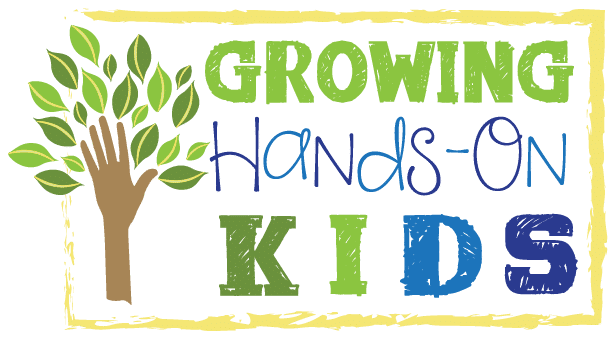
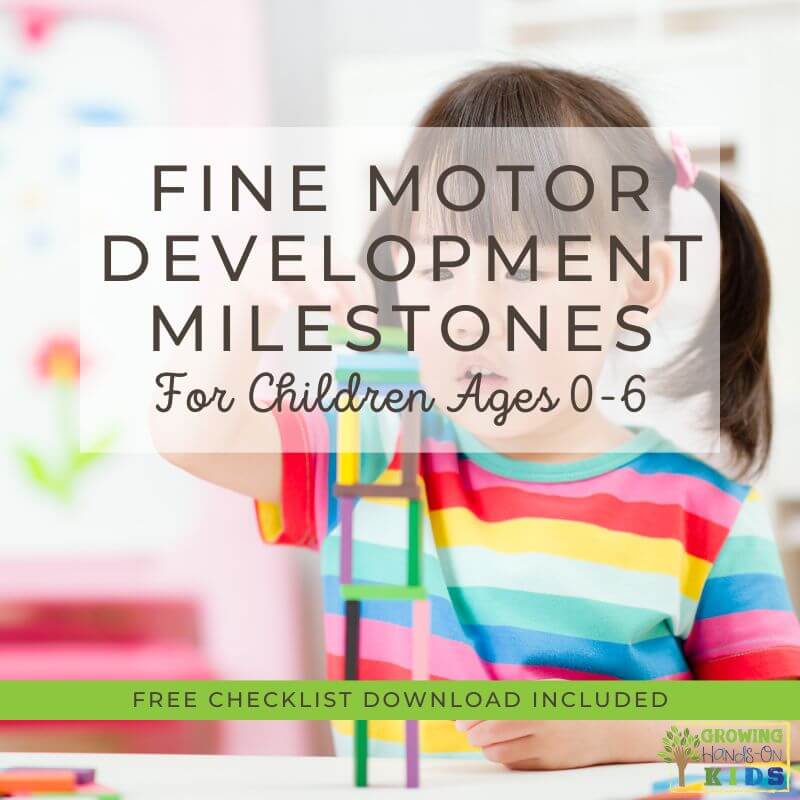
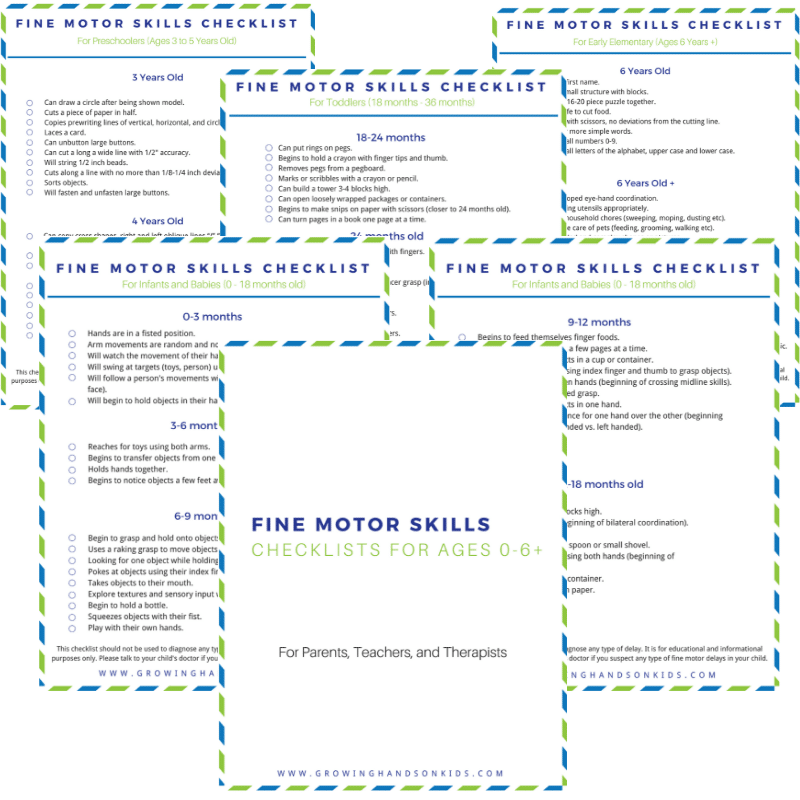
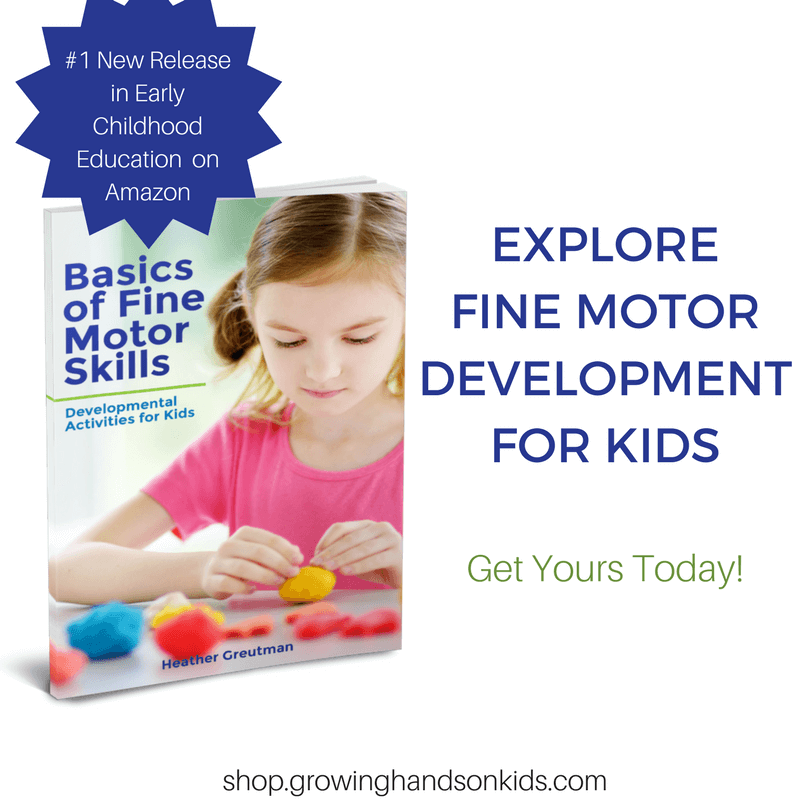
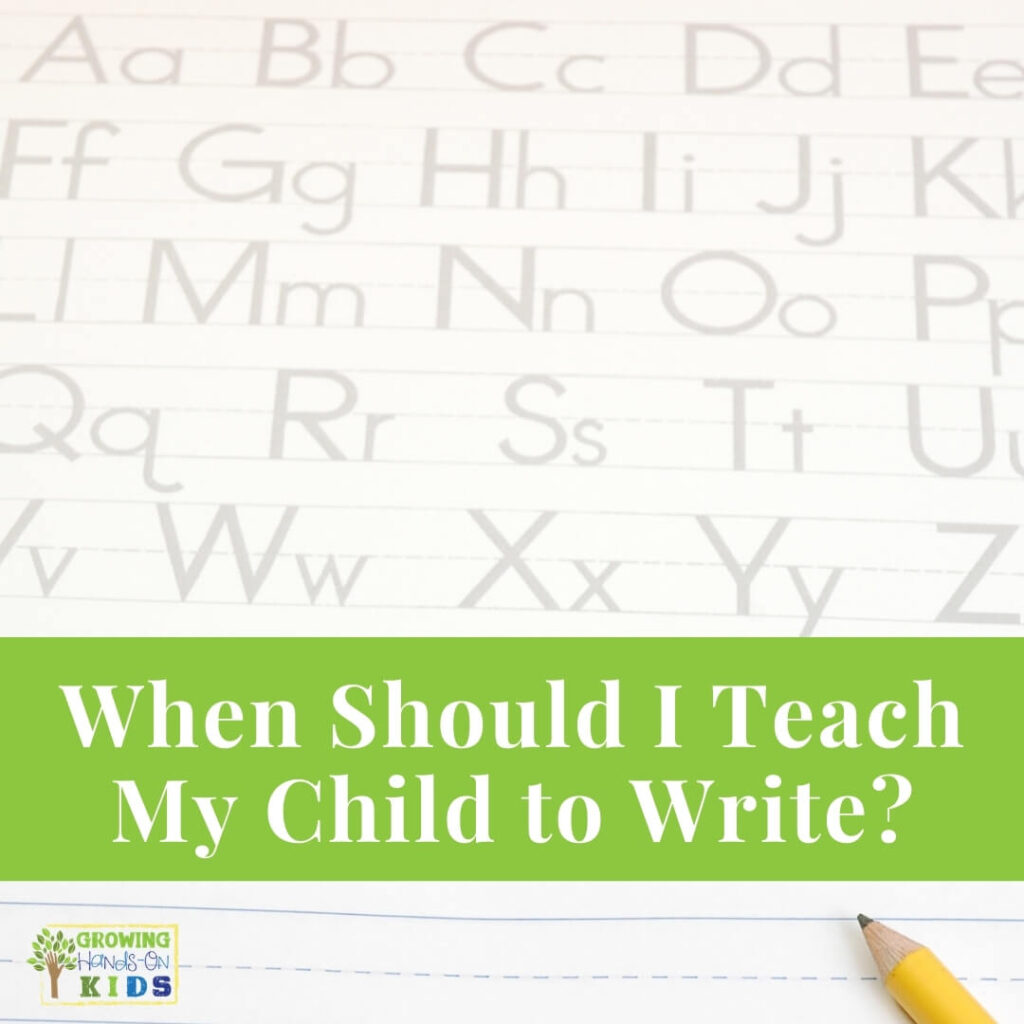
Hello, thank you for excellent content in your website. Im an occupational therapist.
please put some directions about instruments which help hand writting in cerebral palsy children.
I loved reading through these. Only point though, from a Math perspective, age 5, it’s not called a diamond, its a rhombus or parallelogram. Children have to be retaught it if told wrong the first time.
I must confess have really benefitted from your free printable ma.May God Almighty continue to increase you in knowledge.
I adore the printable – so much good information. Do you know of any Spanish translation ones that are good as well by chance?
This is wonderful information! I will refer back to this when thinking up activities for my developing child. Thanks for putting this together 🙂
This is a very handy list, thank you! Such a beautiful, clear and helpful blog! Love it! I also love your Proverbs motto!
Dropping by from KBN FB hop! (Pinning and liking!) Wonderful place!
Have a great weekend,
Ang
Thanks so much, you are too kind!! 🙂